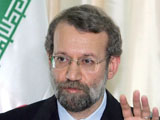|
|
TODAY.AZ / World news
"Western countries turn talks with Iran into 'political show"
02 July 2011 [11:13] - TODAY.AZ
 The United States and other Western countries have turned the negotiations on Iran's nuclear program into a political show, Iranian Parliament Speaker Ali Larijani said at a press-conference in Baku today.
The United States and other Western countries have turned the negotiations on Iran's nuclear program into a political show, Iranian Parliament Speaker Ali Larijani said at a press-conference in Baku today."The U.S. and other Western countries have turned the talks into a political show, as they don’t understand their essence," Larijani said." We welcome the negotiations between Iran and Western countries."
He said the negotiations should be conducted under conditions accepted by both parties, and the U.S. is using them as a tool to achieve its goals.
Iran’s nuclear program has caused concern since 2003, when the IAEA became aware of its concealed activity. In late 2003, Iran signed the Additional Protocol to the NPT and voluntarily announced about the suspension of uranium enrichment. However, it returned to this activity. Iran insists that as a party to the NPT it has the full right to use nuclear technology for peaceful purposes.
The enriched uranium can be used to produce nuclear weapons. However, it is necessary as fuel for atomic power plants. Several countries, including the U.S., are sure that Iran strives to develop nuclear weapons and call for the prevention of this development.
Tehran has denied all charges, saying that its nuclear program has peaceful purposes.
Until now, the UN Security Council adopted six resolutions to stop the nuclear program of Iran and the process of enriching uranium. Four of these resolutions provide economic sanctions against the country.
Following a 14-month break, the talks on Iran's nuclear program between The Six (five UNSC permanent members - the United States, China, Russia, France, Great Britain - and Germany) and Iran took place in 2010 in Geneva in December. The next round of discussions took place in Istanbul on Jan. 21-22, 2011. Catherine Ashton chaired the meeting.
After the Istanbul talks, Ashton stated that she is disappointed with the results of discussions held over Iran's nuclear program.
/Trend/
URL: http://www.today.az/news/regions/89678.html
 Print version
Print version
Views: 3408
Connect with us. Get latest news and updates.
See Also
- 14 February 2026 [23:30]
LA 2028 Olympics chief to sell agency over Epstein uproar: reports - 14 February 2026 [22:55]
Ukraine, ASEAN discuss advancing mutually beneficial cooperation, deepening dialogue - 14 February 2026 [22:25]
Kazakhstan hosts Dala.Camp forum 2026 - 14 February 2026 [21:50]
Three killed in post-election clashes in Bangladesh as BNP secures parliamentary majority - 14 February 2026 [21:20]
Trump says regime change in Iran 'would be the best thing that could happen' - 14 February 2026 [20:15]
N.K. leader again inspects construction of memorial for troops deployed for Russia's war against Ukraine - 14 February 2026 [19:10]
Von der Leyen calls for new European security strategy at Munich Conference - 14 February 2026 [18:35]
China to scrap tariffs for most of Africa from May: Xi - 14 February 2026 [18:05]
Rubio: UN has potential but fails on today’s biggest crises - 14 February 2026 [12:40]
Passenger plane slides off runway at Kazan airport
Most Popular
 Baku and Washington have passed a verdict on the 907th Amendment
Baku and Washington have passed a verdict on the 907th Amendment
 SOCAR discusses joint energy projects with US companies and Israeli cooperation
SOCAR discusses joint energy projects with US companies and Israeli cooperation
 Georgia to restrict older car imports
Georgia to restrict older car imports
 Russia to begin talks with Armenia on restoring railway links connecting Azerbaijan, Türkiye and Iran
Russia to begin talks with Armenia on restoring railway links connecting Azerbaijan, Türkiye and Iran
 Nurda?–Kahramanmara? high-speed rail link to boost regional trade
Nurda?–Kahramanmara? high-speed rail link to boost regional trade
 President Ilham Aliyev gives interview to France 24 in Munich [PHOTOS/VIDEO]
President Ilham Aliyev gives interview to France 24 in Munich [PHOTOS/VIDEO]
 Kahramanmara? rebuilds after earthquake of century
Kahramanmara? rebuilds after earthquake of century
